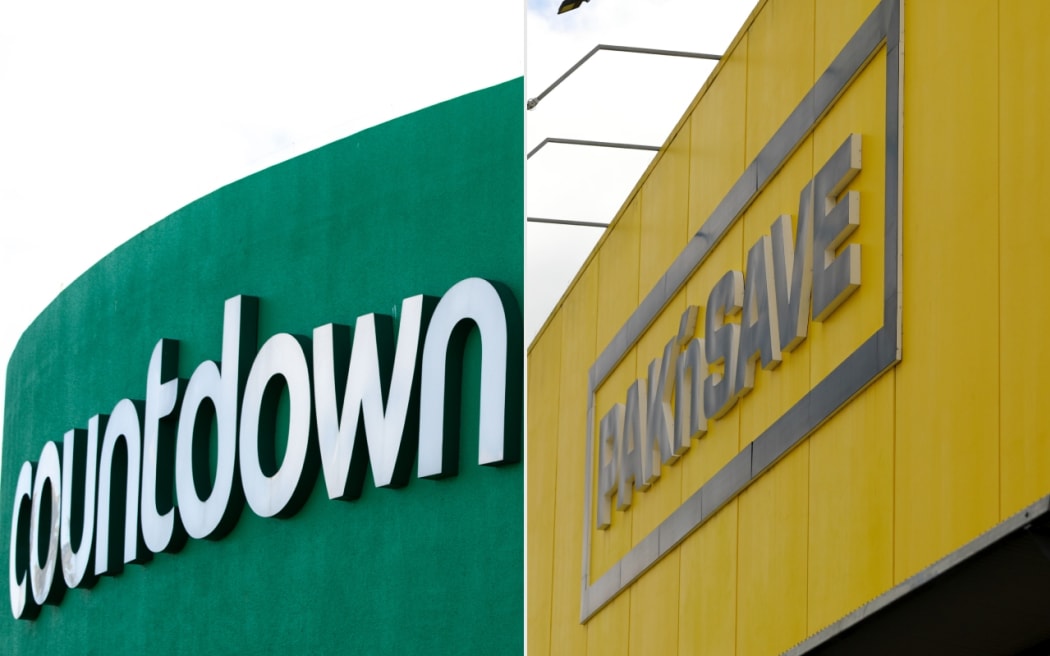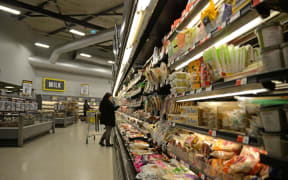The government has launched its Grocery Code of Conduct, saying it is calling time on the coercive behaviour of the big supermarket chains.
Last year, the government announced it planned to introduce an industry regulator, a mandatory code of conduct, compulsory unit pricing and other measures in response to a market study which found the industry was not working well for consumers and competition was stifled.
Minister of Commerce and Consumer Affairs Duncan Webb is launching the new code at an event at Canterbury company Cookie Time on Friday morning.
"The big supermarket chains have not been treating local suppliers fairly - they have been taking advantage of their dominance and imposing unreasonable terms and conditions," Webb said in a statement.

Minister of Commerce and Consumer Affairs Duncan Webb. Photo: RNZ / Samuel Rillstone
"It's entirely reasonable and hardly too much to ask. Local suppliers have been stretched for a long time, and that's stifled innovation and the development of our food supply chain."
The new rules will initially apply to the two main supermarket chains, Woolworths, formerly Countdown, and Foodstuffs, which runs the PAK'nSAVE, New World and Four Square brands.
The code requires supermarkets to act in good faith with suppliers, to pay them on time, have plain-English supply contracts, and bans retrospective contract changes.
Breaches of the Code will result in penalties with fines up to $3 million or 3 percent of turnover, whichever is the greater. Individuals face fines up to $200,000.
However, the code does not take into consideration historical disputes, for which Webb said there were court remedies available.
The code comes into force on 28 September and will be monitored and enforced by Grocery Commissioner Pierre van Heerden, who was appointed in July.

Photo: RNZ / Marika Khabazi, Simon Rogers
At the launch event, Webb said supermarkets were consulted and engaged with on the code, which was based on an Australian model.
"They are working through what it means to implement this code now."
The code was primarily focused on small and medium suppliers because larger suppliers had more bargaining power with supermarkets, he said.
It also applies requirements for the acceptance or rejection of fresh produce. Webb said supermarkets had set their own rules in this area before, and could turn away produce days later, for example, if they did not meet the quality standard, by which point the produce no longer could be sold elsewhere.
"We don't want that kind of waste and we think it's only reasonable that there's a response that's timely and enables them to be sold elsewhere."
New Zealand Food and Grocery Council chief executive Raewyn Bleakley said they have campaigned for over a decade to get a code in place.
They are also going to be training their members to get them ready for the next six months - the grace period for negotiations before the code is fully enforced.
"There's been a little bit of looseness around some of the terms and conditions, some things have been set historically and have sort of been lost [over time] ... that all now has to be documented and made clear so both parties know where they stand," Bleakley said.
"For our suppliers, [the training is] to understand what protections they now have and what hasn't changed ... so that when they go into negotiations they have real clarity and confidence."
'It's essentially an abuse of power to impose such unfair terms'
Webb told Morning Report this would be the last step, at least for now, in the range of measures the government enforced from the Commerce Commission's recommendations last year.
So far, suppliers have had an unbalanced relationship with the dominant supermarket chains, he said.
"We've seen retaliatory combat when a supplier asks for a price increase, all of a sudden their products are removed from the shelves. We've seen some pretty unfair terms, such as having to pay for breakages that happen in the supermarket when it's got nothing to do with the supplier.
"The supermarkets have been demanding some pretty extraordinary terms, you know, payment of 60-90 or more days, and that's not how small businesses work and that's the kind of thing we want to crack down on.
"I think I've said it's essentially an abuse of power to impose such unfair terms. That's why we need a code like this and we need an independent watchdog to make sure that the code is complied with."
While the Grocery Commissioner was expected to be proactive about monitoring the big supermarket chains to be compliant with the code, suppliers should also let the commissioner know if something was going wrong, he said.
Suppliers can also take their disputes to an independent disputes authority, which can deal with disputes of up to $5 million.
"We can certainly expect that suppliers can be more innovative, can deliver better products better to supermarkets and over time I would expect this to have an impact on prices, on quality and on variety, and that's what competition is," Webb said.
"I want to be really clear that if we don't see the change that's required, both at the supply side and at the checkout end, we will take further action and we've always been clear about that."
Step in the right direction - Vegetables NZ
Vegetables New Zealand says the new grocery code of conduct is a step in the right direction to making deals between growers and supermarket buyers more transparent.
Chief executive John Murphy said the 20 percent of other grocery retailers should be subject to those new conditions too.
It was about ensuring fair trade of healthy, homegrown veggies, Murphy said.
"We particularly like the fact that the new code requires payment on time and those plain English supply contracts, it's really important. It seems like it would be a given," he said.
"There's a massive number of transactions and people along that supply chain so its really important we're clear as day on those things."
Murphy said most transactions were straight forward and tidy.
"There's always going to be a few outliers where things go wrong on a deal. I think that's where we need a bit of rigour and transparency as well," he said.
"It's when things don't go so well that having a backstop might be healthy."
Growers will continue working closely with the Grocery Commission and new commissioner to explain the dynamics of commercial vegetable growing, he said.
More details on the code are available on the Ministry of Business, Innovation and Employment website.






